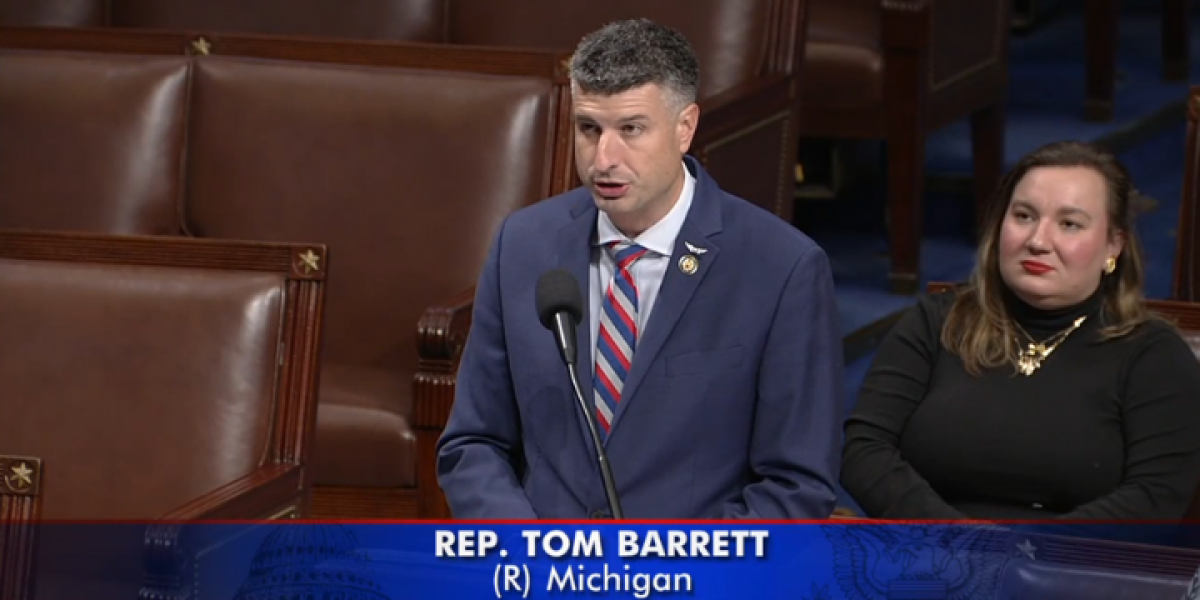Barrett’s Third Bill Clears House of Representatives with Unanimous Support

Bipartisan TRANSPORT Jobs Act to Help Connect Veterans with Supply Chain Careers
Washington, D.C. — Congressman Tom Barrett (MI-07) continued to deliver results today as the U.S. House of Representatives unanimously passed his bipartisan Transitioning Retiring And New Service Members to Port, Ocean, Rail, and Truck (TRANSPORT) Jobs Act. This is Barrett’s third piece of legislation to be passed by the House this year.
The TRANSPORT Jobs Act will connect military veterans with supply chain employment, meeting critical needs in America’s transportation and supply chain workforce while helping veterans secure careers that put their skills and experience to use.
“Entering civilian life after years in the military is a big leap, especially for those who enlisted right out of high school and never had another full-time job,” said Barrett. “Whether they drove heavy-duty vehicles, crewed a ship, or managed logistics, many veterans developed skills that are essential for reducing labor shortages in our supply chain. My TRANSPORT Jobs Act will knock down barriers and empower our nation's heroes to reach their full career potential while delivering goods to our factories, stores, and homes across America.”
The TRANSPORT Jobs Act (H.R. 3055) would direct the Department of Transportation to collaborate with the departments of Defense, Veterans Affairs, and Labor to develop a “Veteran to Supply Chain Employee Action Plan.” The plan would identify challenges for veterans seeking supply chain employment, including government regulations. The plan would also recommend steps the federal government can take to reduce barriers to entry and help veterans enter supply chain careers.
“Congressman Barrett’s bill helps our nation’s veterans translate and transition the skills and knowledge they attained while in the service to civilian occupations in the transportation sector, while also addressing the labor shortage challenges in the freight and logistics industries,” said House Transportation and Infrastructure Committee Chairman Sam Graves (MO-06). “As an Army Veteran and T&I Member, Mr. Barrett has been a leader on this issue, and I want to thank him for his work on this legislation.”
“With one in six railroad employees having served in our Armed Forces, we are proud to support the TRANSPORT Jobs Act, which expands opportunities for veterans throughout the supply chain,” said Ian Jefferies, president and CEO of the Association of American Railroads (AAR). “Their dedication, mission focus, and pride in service are invaluable assets to our industry and to the nation. By streamlining processes, removing barriers to entry, and creating new pathways, we can ensure more veterans find meaningful employment and continue to power America’s economy.”
“Trucking is proud to be a source of good-paying jobs for veterans. No one understands the importance of logistics better than our military, and when our brave servicemembers return home, their skills are in high demand,” said American Trucking Associations Senior VP of Legislative Affairs Henry Hanscom. “ATA applauds Reps. Tom Barrett and Hillary Scholten for their leadership on the TRANSPORT Jobs Act, which will help connect veterans with rewarding careers in our industry. This bill has overwhelming, bipartisan support, as reflected by its passage in the House. The trucking industry will continue to advocate for its swift enactment into law so that veterans can begin the next chapter of their service to our country.”
Background:
Veterans often struggle with the transition from military service, and surveys show that finding a job is a top concern. At a recent meeting Barrett held with mid-Michigan veterans, much of the discussion shed light on the need to address the shortcomings of current federal programs for assisting veterans with the transition into civilian life.
Barrett’s first two bills to clear the House, the Clear Communication for Veterans Claims Act and the Automotive Support Services to Improve Safe Transportation (ASSIST) Act, also passed unanimously.